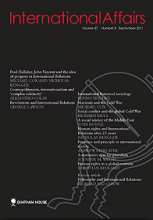This literature review seeks to reorient the discourse on radicalization to consider the connection between communication technology and violent extremism. By interrogating three central questions vexing policy-makers, law enforcement officials and academics, this review moves away from a monolithic understanding of the internet and showcases the opportunities afforded by different communications technologies within the context of radicalization and recruitment. As this discussion shows, there is a consensus that despite significant exceptions to the rule, the internet alone does not act as a radicalizing agent, but rather serves as a facilitator and catalyst for terrorist organizations and their respective networks. Despite varying analyses produced within the literature, there is agreement that the virtual sphere does not replace the real world in most instances. Above all, a review of the current literature demonstrates that to answer the crucial questions posed in this article, more empirically-based research is required. This article is a revised and updated version of the 2017 VOX-Pol report Research Perspectives on Online Radicalisation: A Literature Review 2006 to 2016.
